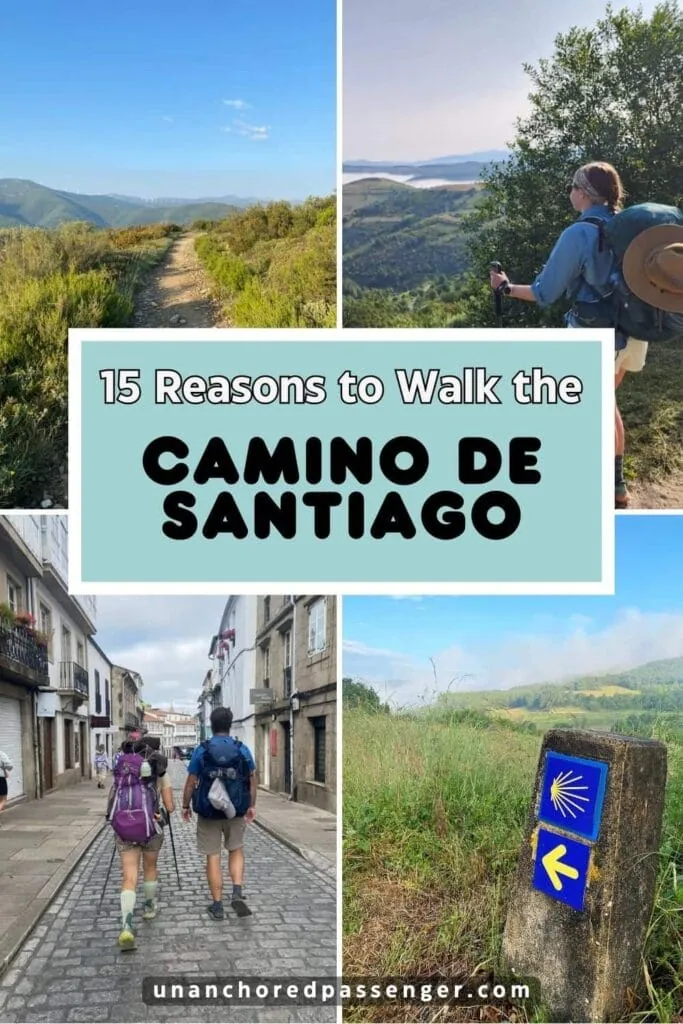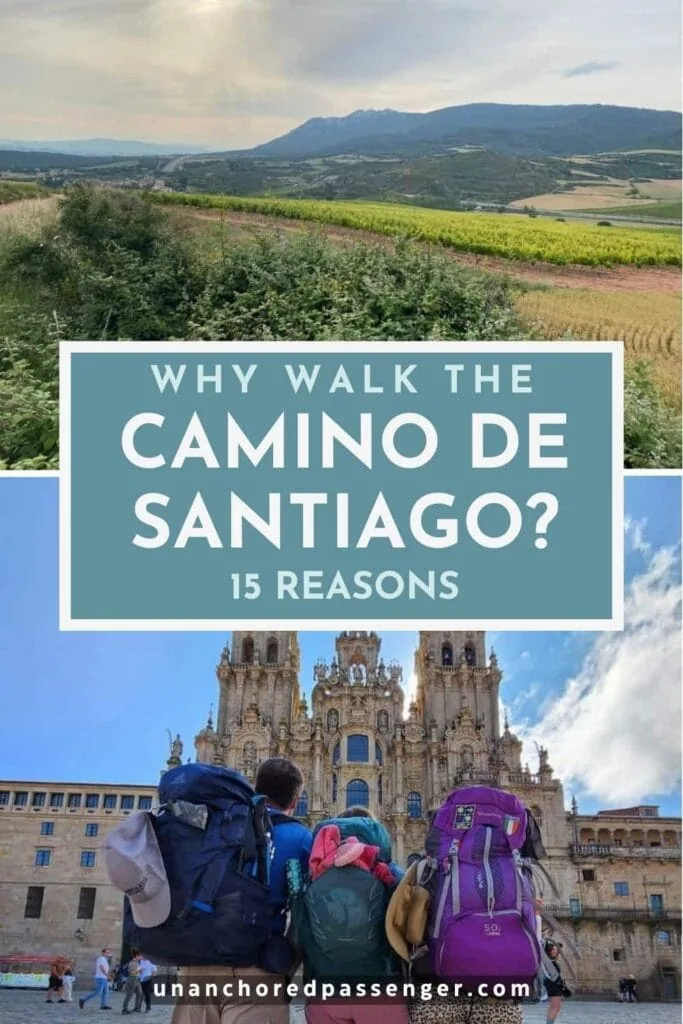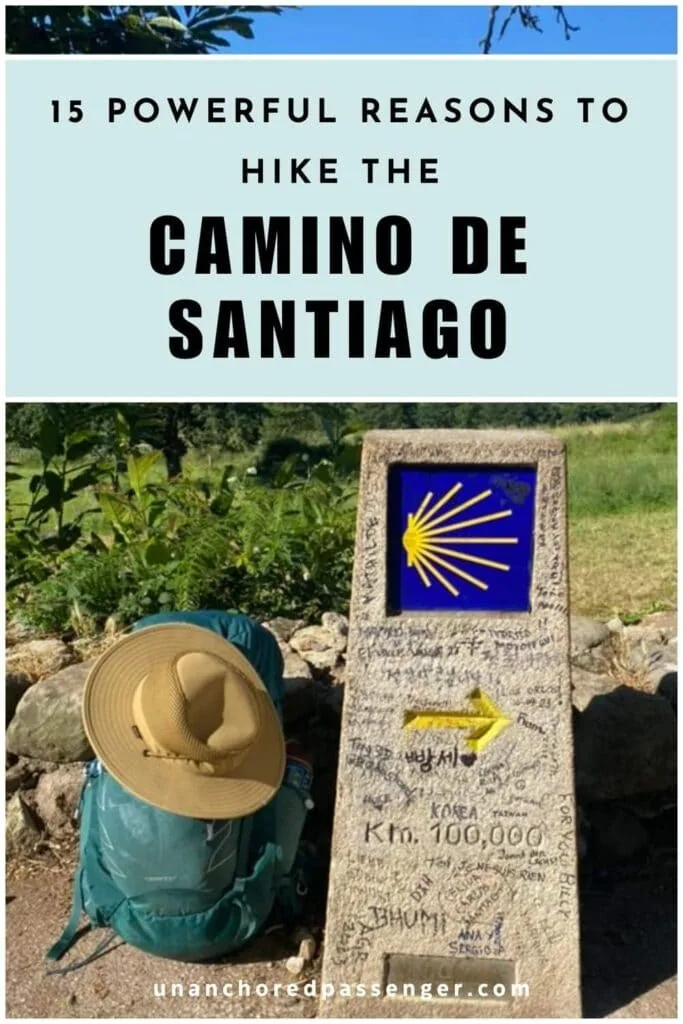Why Walk the Camino de Santiago: 15 Reasons
If you've made it to this post, you're probably asking yourself questions like: Why walk the Camino de Santiago? Is the Camino for me?
If you're looking for answers, keep on reading. In this post, I'll dive into 15 reasons why you should consider walking the Camino de Santiago, also known as the Way of Saint James, based on my own experience.
I hiked the Camino Francés route myself in 2023, starting in Saint-Jean-Pied-de-Port and spending 33 days hiking almost 500 miles through Spain. In this piece, I share reasons to consider walking the Camino from my experience, including why I decided to do it after my broken engagement.
I figured you wouldn't want to just hear from me here, so I've also spent some time talking with my Camino friends for this piece. Throughout, you'll see I've woven in their perspectives as well.
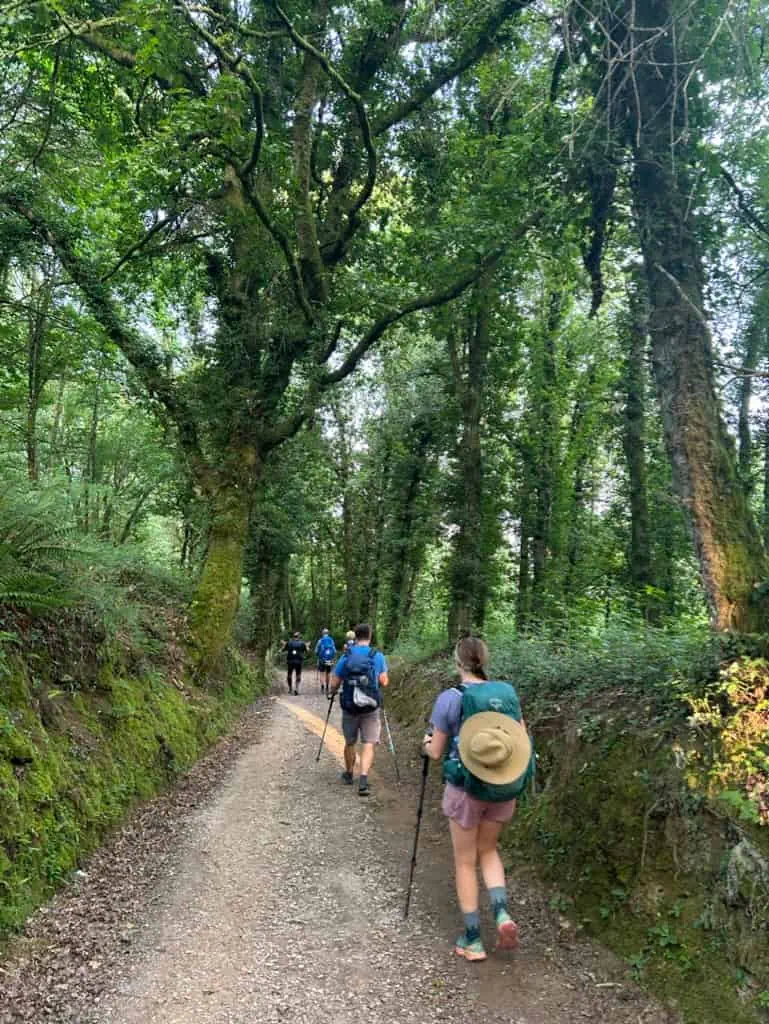
1. You can escape from the stress of daily life and enjoy the small things.
There's something so refreshing about taking a trip where you can fully unplug and all you have to worry about is pretty much just walking, eating, and sleeping.
You don't need much to be happy–sometimes, everything you need fits in a backpack.
Jana from Germany
It's shocking how much space and energy gets freed up in your mind and body when you aren't constantly stressing about the next thing that needs to get done or trying to figure out what to do next.
This space from regular life and the simplicity of the Camino help you to really enjoy and appreciate the small things.
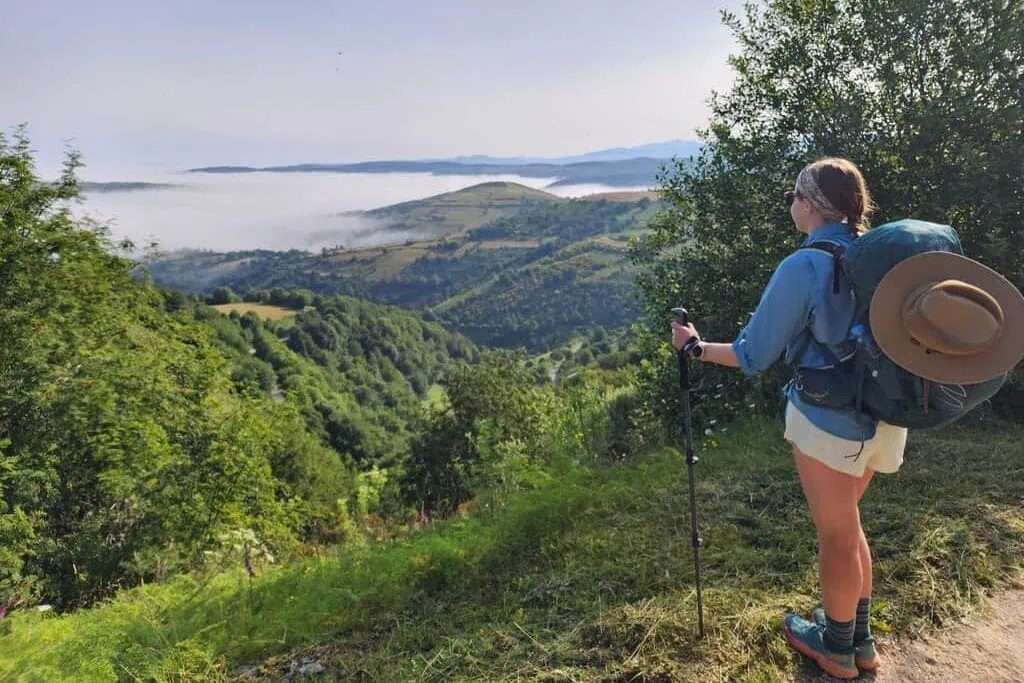
2. The simplicity of the journey allows you to do some soul searching and reflecting.
The Camino gives you a kind of peace and time to yourself that you don't get in your normal day-to-day life. It creates a space where you have the ability to think more deeply about your life, reflect on the past, and contemplate what's next.
I felt lost, with the future scaring me and a sense of uncertainty weighing me down. But during the Camino de Santiago, I learned that life, despite everything, always offers us new opportunities. Today, almost two years later, I feel reborn, stronger and more determined than ever, ready to face every challenge with an energy I never thought I had. It's true that the real Camino begins in Santiago.
Ciri from Sardinia, Italy
Even if it's not your intention to do the Camino with soul searching in mind, you might find that having so much time to yourself and meeting unique people will spark something in you to reexamine your own life.
It's not uncommon to find people who have hiked the Camino and realized they needed to make a life change when they get home.
I hiked the Camino already knowing I wanted a life change, but it really enforced it for me. I felt like my regular life was so all consumed by my stressful job and that I wasn't really living. The Camino encouraged me to keep planning to make a change.
The Camino is a journey of the soul. It reveals who you truly are beneath the noise of everyday life.
Jana from Germany

3. The Camino is a significant historic religious journey.
The Camino de Santiago is arguably the most significant and historic Christian pilgrimage in the world. For centuries, millions of people have made the journey to Santiago de Compostela to visit the alleged remains of Saint James there.
Many people still undertake the journey for religious reasons to see Saint James' remains and visit cathedrals and other religious sites along the way. In many towns along the Camino, you can find churches that will provide pilgrim's mass and a blessing for your journey.
I didn't necessarily hike for religious reasons personally. However, I appreciated being able to embrace that part of myself during the Camino and to take part in such a significant adventure like so many before me.
I enjoyed attending pilgrim's mass a few times, singing with nuns volunteering at an albergue, and seeing some of Spain's most beautiful cathedrals. Having studied abroad in Spain, I've seen so many cathedrals that I'm not usually very into them anymore, but I'll never forget the extremely ornate cathedral in Burgos.

4. It's fairly affordable.
For a trek that can take as long as a month or more, the Camino de Santiago is fairly affordable. You don't need to buy much fancy hiking gear, and costs along the way are reasonable as well.
If you plan to stay in albergues, I would budget around €50 per day for food and accommodations to be safe. However, you might not need that much, especially if you stay in municipal albergues, which are usually the cheapest and more bare bones.
If you plan to book more private rooms, then I would budget potentially around €100 per day for food and accommodations.
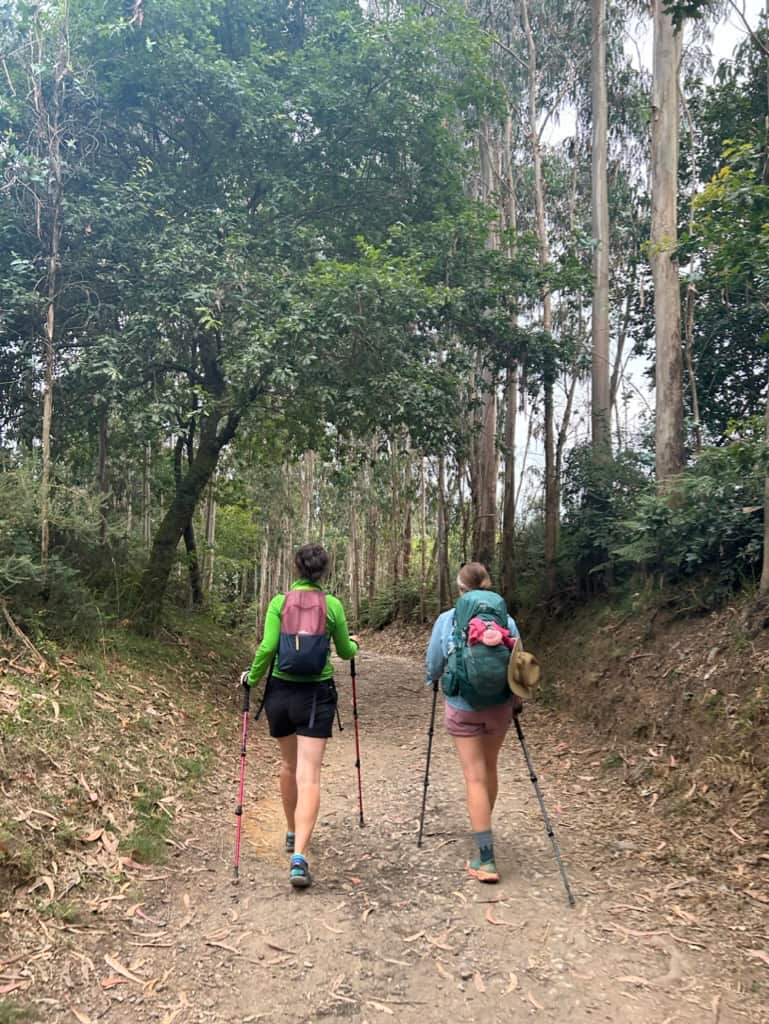
5. The Camino allows you to make friends from all over the world.
In 2024, people from over 200 different countries and territories completed the Camino de Santiago. It's truly a journey that attracts people from all over the world, and typically many people doing the Camino are looking to make friends with other pilgrims.
On the Camino, you'll often start to notice the same people around you when hiking each day, especially on some of the more popular routes like the Camino Francés or Camino Portugués. It's not uncommon to strike up a conversation with someone you haven't met yet while hiking or when stopping at a restaurant for a bite to eat.
I think it's special how the Camino connects people from all over the world, people you would otherwise never meet.
Clemens from the netherlands (See his youtube channel for videos from his caminos)
I'm an introvert and worried a little about making friends before I started my Camino, but I found it quite easy once I started. In the end, I left with friends from all over Europe, Australia, Brazil, and the U.S. It was a great group of people, and I still keep in touch with them, even now almost two years later.
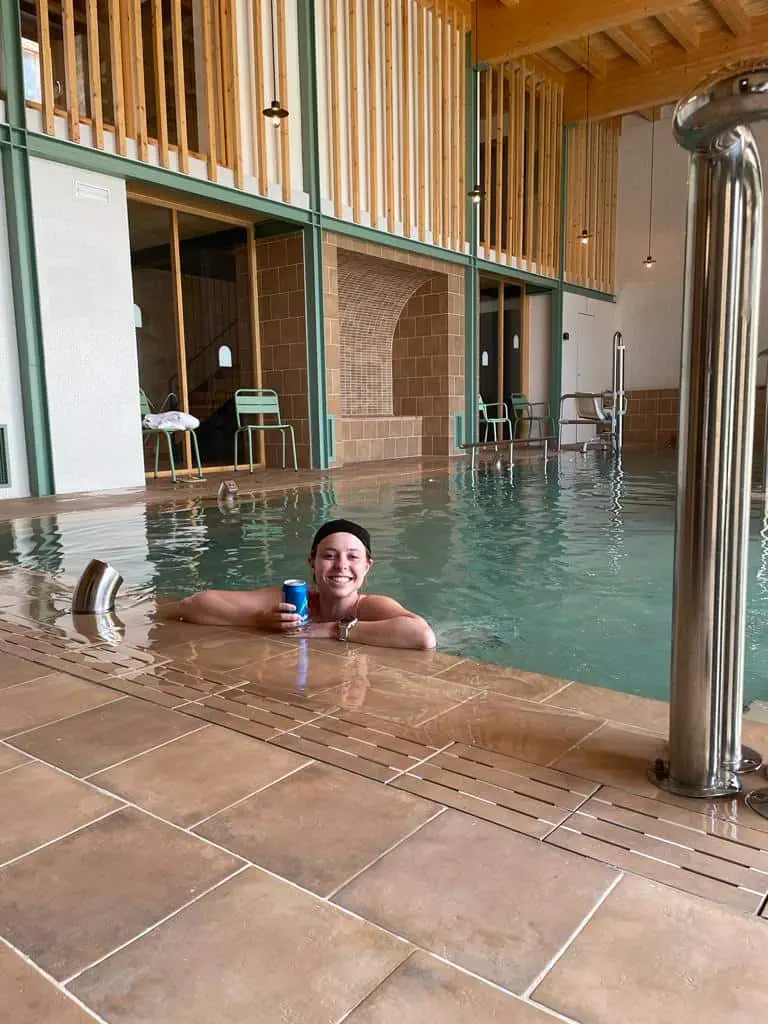
6. You can experience a long-distance hike in relative comfort.
If you enjoy long-distance physical activities but aren't as keen to spend the night in a tent and forego civilization altogether, then the Camino is for you.
Most pilgrims walk from town to town, staying in hostel-like accommodations called albergues each night. If shared accommodations aren't for you though, you can often find private rooms. One of Spain's nicest hotel chains even has multiple hotels along some of the routes.
Parador Hotels
The Parador Hotels are considered some of the most luxurious and historic hotels in Spain. Many are located along the Camino and are fairly affordable. I recommend booking the Parador Hotel in Santiago de Compostela as a treat for the end of your Camino.
➡️ Get Parador Info + Book Here
Most days on the Camino involve hiking for several hours in the morning to afternoon and stopping at restaurants for breakfast and lunch on the way. Once you arrive at your accommodation, you typically shower, wash your clothes, and take a nap before getting dinner in town.
Without having to camp, you don't have to carry as much with you, which makes hiking during the day more comfortable. There are also services to carry your bag for you if you don't want to carry your full pack.
If anything happens and you need to skip some of the hiking due to injury, there are buses and taxis available as well. I had some friends who had such bad blisters that they had to skip some of the hike but wanted to stay with the group so took the bus instead of walking.
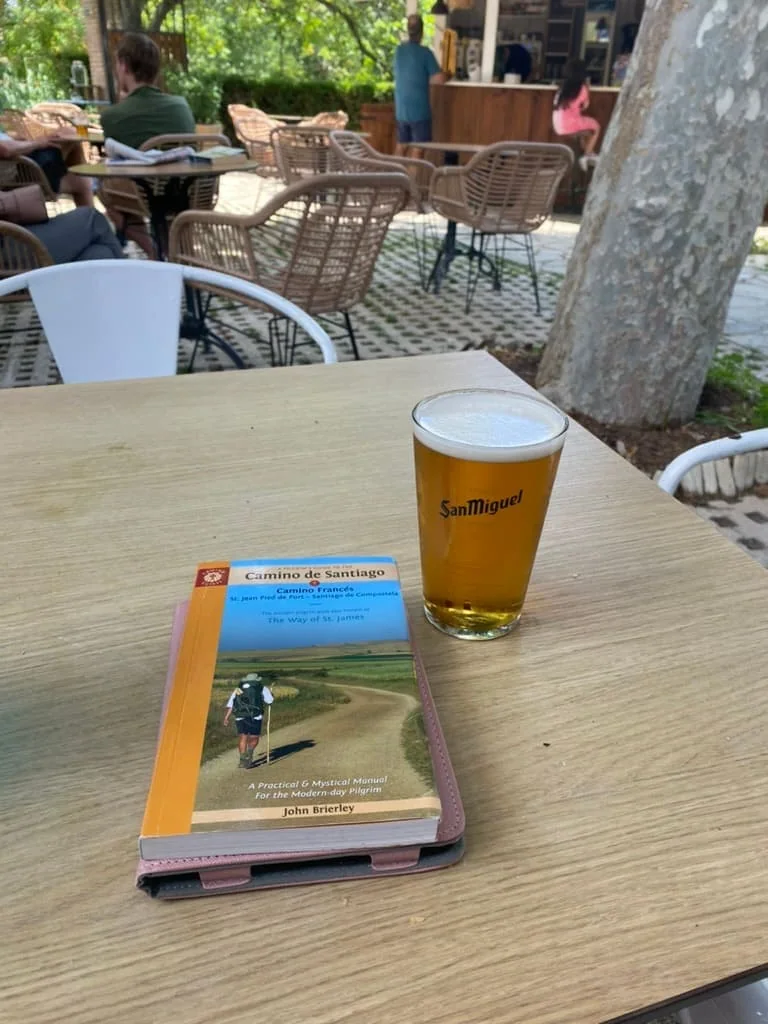
7. You don't need to do much planning in advance.
One of the beauties of the Camino is the lack of planning needed for the journey. The most important thing to research and nail down ahead of time is what you're bringing with you. Otherwise, you can generally just show up and figure things out as you go.
That's not to say you shouldn't do some research and preparation beforehand, but this isn't something that you need to start planning and booking months in advance.
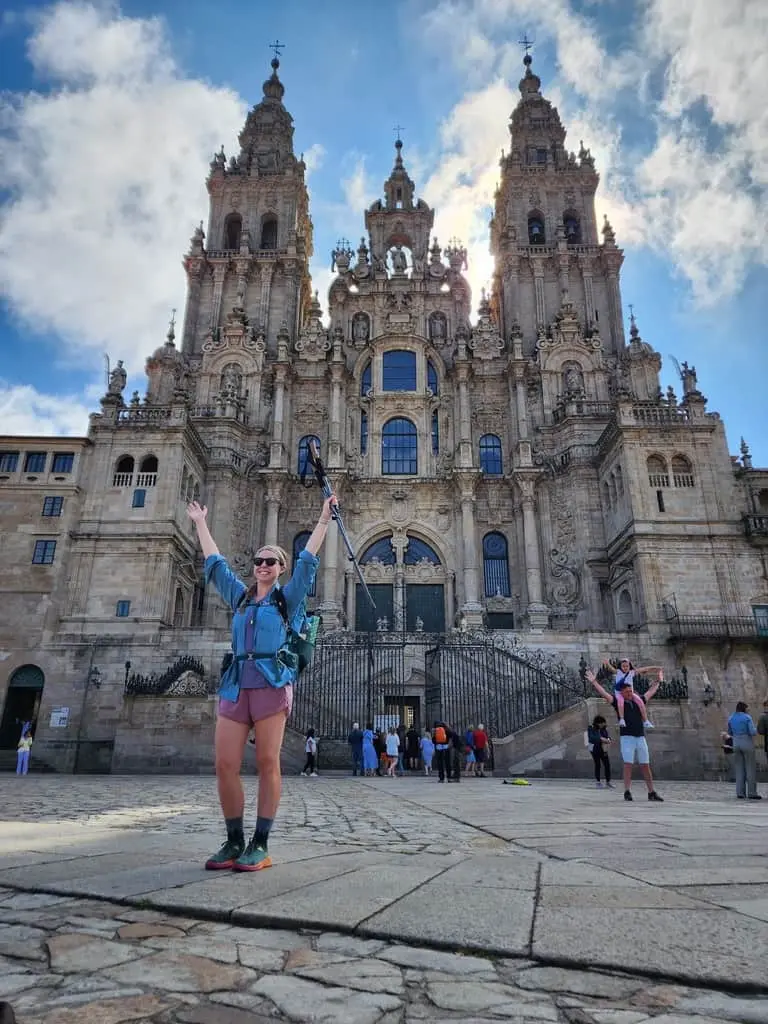
8. It can help you heal from heartache.
Many people will walk the Camino de Santiago to try to heal from heartache of some kind, whether it's from loved ones passing away or from breakups.
I first learned about the Camino when I met someone who had hiked after a bad breakup with her boyfriend. Little did I know, I'd hike for a similar reason years later.
While I had long wanted to hike the Camino de Santiago, it wasn't until my engagement ended that I really felt pushed to do it. I knew I needed to take the time to give myself an incredible adventure and to heal from what was a heartbreaking turn in my life at that time.
My time on the Camino gave me my joy back. I was able to move on from the painful memories and make new ones with this incredible adventure.

9. You can intimately see Spain or Portugal.
How many times can you say you visited a country by walking through it? For me at least, that number was 0 before the Camino.
If you've ever wanted to see more of Spain or Portugal, the Camino de Santiago gives you the opportunity to do so in such an intimate and unique way.
I loved walking through northern Spain along the Camino Francés and seeing the landscapes slowly change. From the Pyrenees Mountains to the rolling hills of vineyards, the hot and flat Meseta, and then lush green forests of Galicia, it was incredible to get to see everything so closely.
I also appreciated the way the Camino took me through parts of Spain that I likely never would have seen otherwise. I usually gravitate towards cities when traveling, but I found so much of the charm of the Camino in the smaller towns and in nature along the way.

10. The Camino is popular among solo travelers and generally safe to do solo.
If you are worried about doing something like the Camino de Santiago alone, don't fret. It's very popular among solo travelers. In fact, almost everyone I met on the Camino Francés was hiking solo.
I also never felt unsafe as a solo female. As a woman, I would never feel safe hiking alone in the U.S., but that feeling never hit me on the Camino.
The Camino is such a great experience for solo travelers that I plan to do more Camino hikes in the future.
If you want inspiring conversations, to meet interesting people from all over the world, and you are into amazing food and wine, then walk the Camino!
Jana from Germany
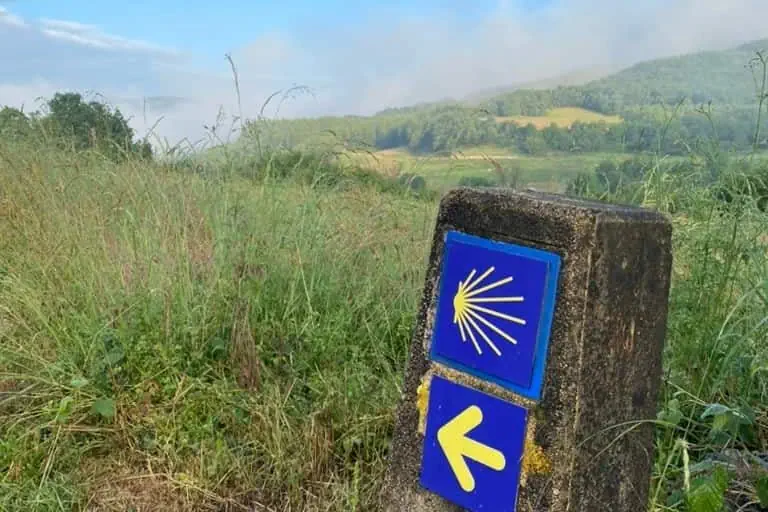
11. It’s one of the only UNESCO-recognized pilgrimage routes.
To add another testament to the significance of the Camino de Santiago, it's only one of two UNESCO-recognized pilgrimage routes in the world.
The only other pilgrimage route designated by UNESCO is Japan's Kumano Kodo.
12. You’ve already hiked the Kumano Kodo in Japan.
Speaking of the Kumano Kodo, those who have already hiked it may be more motivated to hike the Camino de Santiago.
Since the two pilgrimages are tied with their UNESCO designations, officials in Spain and Japan decided to create a dual pilgrim program for people who completed both journeys.
Pilgrims who complete both treks can get a special certificate and badge indicating that they are a dual pilgrim.

13. You don't necessarily need much hiking experience.
The Camino de Santiago does not require you to have much technical hiking experience or training. This of course depends on the route, but the most popular routes like the Camino Francés and Camino Portugués have fairly mellow terrain.
While you should spend some time preparing your body for walking long distances each day with a heavy pack, you won't need to train for years for this. That's not to say it's easy, but not having much hiking experience shouldn't hold you back.
14. There are a variety of routes to choose from.
The Camino de Santiago has many different routes to choose from. Whether you're looking for a more social experience or something more solitary, there's a route for you.
Routes cover a variety of distances, and you can pretty much start wherever you want. There are opportunities to hike over the span of just one week or as long as 5-6 weeks.
If you have more time, I recommend a longer hike for a more impactful experience. If you can't take that much time though, I still recommend doing whatever you can fit in with your schedule because it's still an incredible experience regardless.
There are also no rules on how much time it takes you to complete your Camino. Some people will complete it in sections at a time, hiking as much as they can over a week and then returning, sometimes years later, to pick up where they left off.
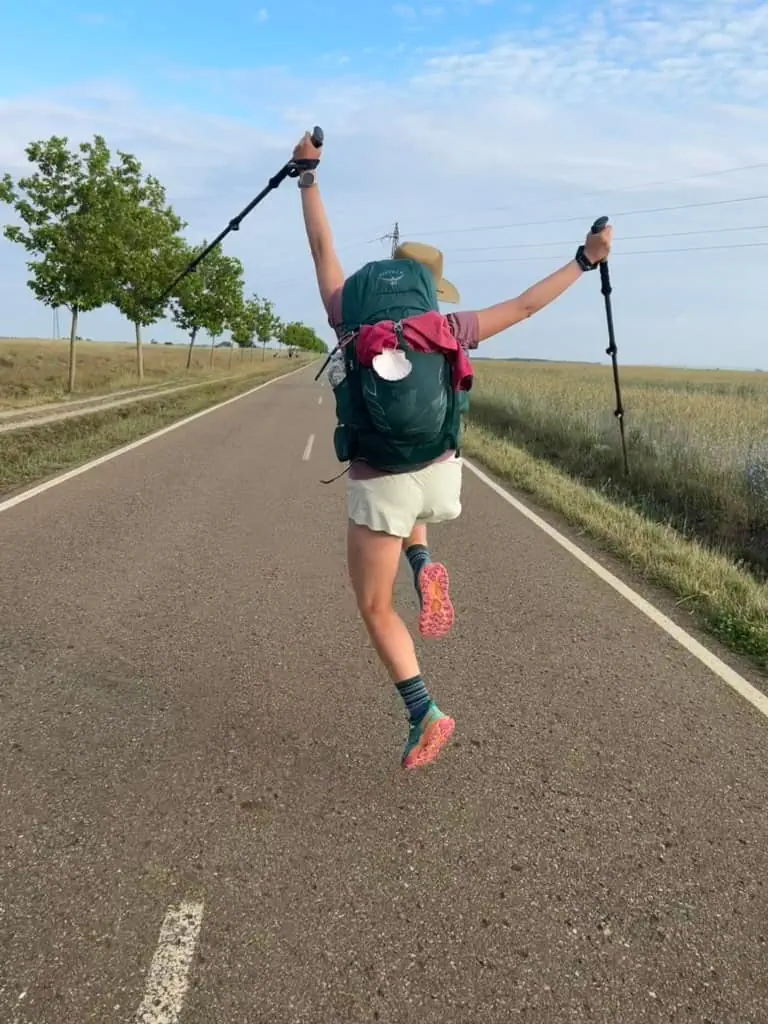
15. The Camino can help you find strength and confidence in yourself.
The Camino de Santiago is a physical and mental challenge. It will probably put you out of your comfort zone at times. In overcoming these challenges, you'll find a strength and confidence in yourself perhaps like never before.
You should hike the Camino to challenge yourself, push your limits, and meet amazing people on the same journey as you. The Camino changes lives and perspectives and grows you in ways you wouldn't even imagine.
Bridgette from Kentucky, United States
I know I personally felt stronger afterwards, not just physically but mentally. Even though I had run many marathons and an ultramarathon previously, I still consider the Camino de Santiago my greatest challenge and physical accomplishment.
I was able to push through mistakes and pain to hike almost 500 miles over a month. It was extremely challenging at times, but also incredibly rewarding.
Many people do the Camino to try and escape their demons, but I think quite the opposite is true. The solitary silence out there, day after day, forces you to confront everything that haunts you, and I believe you come out better for it.
Hiram from Florida, United States but living in Spain
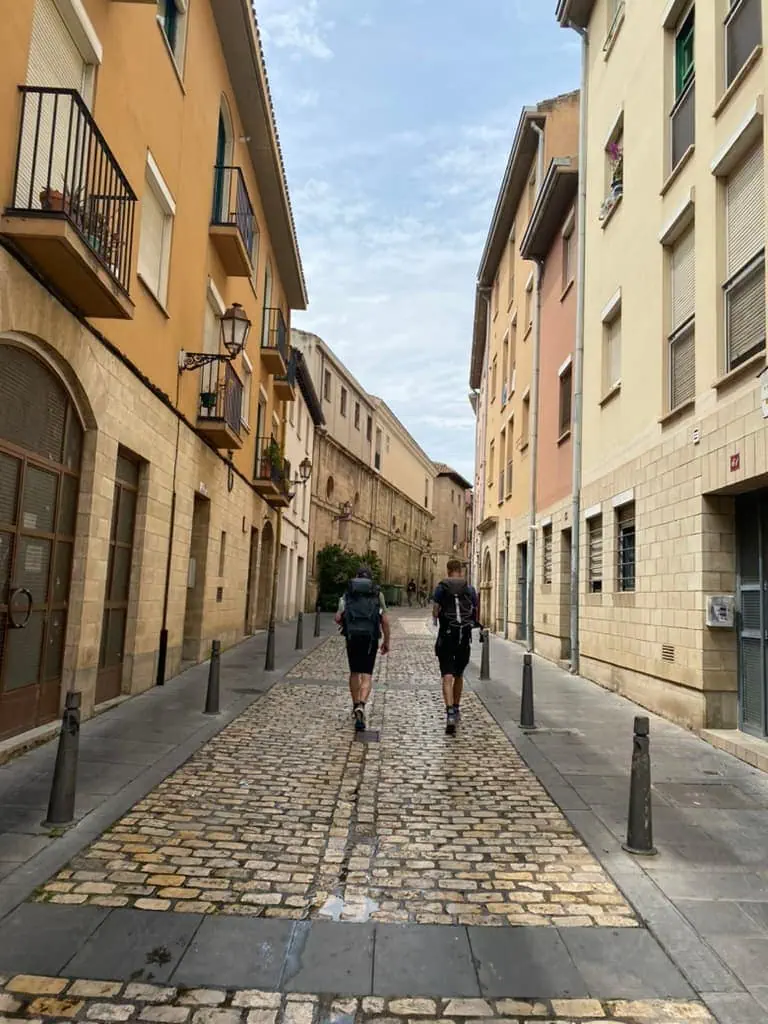
Frequently Asked Questions
Here are some answers to frequently asked questions when it comes to why you should consider walking the Camino de Santiago.
What is special about the Camino de Santiago?
The Camino de Santiago historically has been important as a network of routes guiding travelers to the alleged remains of the Apostle Saint James. Many today still undertake the journey for a variety of reasons.
The Camino is a unique experience with physical and mental challenges that many find meaningful spiritually. It provides opportunities for friendship, reflection, and new beginnings.
Those who hike the Camino de Santiago always say there's this thing called “Camino magic” to be found on the trail. It might look like cattle guiding a lost hiker through a thunderstorm or a message picked out of a box of encouragement that felt like it was meant specifically for that person.
(Side note–both of these are true stories! The first happened to someone I met on my Camino and the second to me.)
Why is the Camino de Santiago so popular?
The Camino de Santiago grows in popularity each year. It's been gaining popularity for centuries as a well-established pilgrimage with many places to stay and eat along the way.
It offers a physical challenge, camaraderie with new friends, and the opportunity to unplug from regular life. The Camino is quite accessible to the average person, requiring little planning and funds.
How long does it take to walk the Camino de Santiago?
It can take anywhere from a few days to as many as 6 weeks to walk the Camino de Santiago, depending on the route and starting point chosen.
Understand a Typical Day on the Camino de Santiago
As you can see, there are so many reasons to walk the Camino de Santiago. From an epic adventure to meeting people from all over the world, finding yourself, and more, the Camino has so much to offer.
Now you might be wondering what it's really like to do this pilgrimage. Read next about what most days on the trail are like to get a better understanding of this experience and if it's for you.
